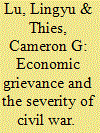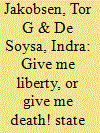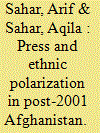|
|
|
Sort Order |
|
|
|
Items / Page
|
|
|
|
|
|
|
| Srl | Item |
| 1 |
ID:
163426


|
|
|
|
|
| Summary/Abstract |
Previous scholarship has identified an emerging consensus for ethnic-policy reform in China, in the direction of strengthening national integration and a ‘melting pot.’ This article identifies three major contending schools in Chinese debates about the country’s ethnic governance: liberal autonomists, integrationists and socialist autonomists. It argues that the socialist autonomists, who oppose the ‘melting pot,’ have prevailed politically. Contention among the three schools, specifically, revolves around tradeoffs between autonomy and ethnic particularism. That is, compromised autonomy but preferential policies. The liberal autonomists reject the tradeoffs because of the cost to autonomy. The integrationists reject the tradeoffs because of the divisive role of ethnic particularism. The socialist autonomists, however, embrace the tradeoffs because of the developmental and distributional benefits. With the leftward turn of the Xi Jinping regime, they have prevailed ideologically and politically to safeguard the current system from any fundamental change.
|
|
|
|
|
|
|
|
|
|
|
|
|
|
|
|
| 2 |
ID:
107883


|
|
|
|
|
| Publication |
2011.
|
| Summary/Abstract |
This article examines the relationship between economic grievance and the severity of civil war. Theoretically, we create a testable micro-foundation for the association between economic grievance and conflict intensity. We argue that grievance does not lessen after the onset of civil war. Rather, pent-up grievance aggravates violence during the war. The more relative deprivation there is prior to the conflict, the more deadly and violently participants are expected to behave on the battlefield. This proposition is tested in a statistical analysis using the Armed Conflict Dataset (1960-92). Empirically, we demonstrate that economic grievance makes civil war more deadly. This effect is independent of the effect of ethnic grievance.
|
|
|
|
|
|
|
|
|
|
|
|
|
|
|
|
| 3 |
ID:
089017


|
|
|
|
|
| Publication |
2009.
|
| Summary/Abstract |
Recent research on the causes of civil war seeks to identify whether group grievances, or opportunity for organisation, motivates rebellion. Similarly, scholars debate whether ethnicity matters in civil war due to group grievances or the opportunity to mobilise. We introduce the lack of empowerment rights, defined as social, political and economic empowerment directly and conditionally in models of civil war onset using novel methods and data. We find no direct effect of repression of rights on war, but higher ethnic fractionalisation increases the risk independently. Nonetheless, higher levels of repression condition the effects of ethnic fractionalisation in ways that maintain peace. State policies that dis-empower people under conditions of high fractionalisation actually reduce the chance of civil war. We do not find that high fractionalisation is only related to lower level armed conflict as some have suggested, but it seems to explain onsets of civil wars above 25 deaths but lower than 1,000 and conflict measured above 1,000 deaths for the period of study that our data allow. The conditional effects of repression and ethnic fractionalisation explain onsets at both levels of war. Our findings are generally unsupportive of the view that grievances due to lack of ethnic group rights drive civil war, but it seems that the opportunity to mobilise does.
|
|
|
|
|
|
|
|
|
|
|
|
|
|
|
|
| 4 |
ID:
144165


|
|
|
|
|
| Summary/Abstract |
This article analyses the contents of three newspapers affiliated with the Tajik-dominated Jamiat and Shura-e-Nezar factions that were deployed during the 2014 presidential election to publicize ethno-political polarization for instrumental ends. The practice of nurturing ethnic identities serves as a microcosm of the broader context in which identity politics, besides coalition-building, rent-seeking, and patrimonial interdependencies, has become a key feature of post-2001 politics. This article focuses on how these factions used these newspapers to polarize ethnic cleavages to win legitimacy for themselves and defamation for their Pashtun-dominated rival factions – Hezb-e-Islami Gulbuddin and the Taliban. It will be years before the ethnic mujahedeen and muhajereen and the new generation reach a mutually binding and working condition that facilitates the country's long-term stability. Reaching this condition is critical because the future of Afghanistan lies in the commitment of its people to form a united community that resolves disputes in the manner of a democratic nation.
|
|
|
|
|
|
|
|
|
|
|
|
|
|
|
|
|
|
|
|
|